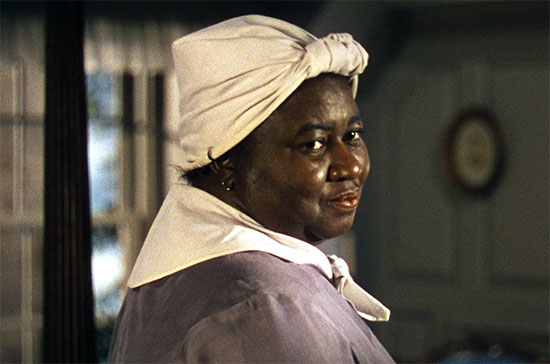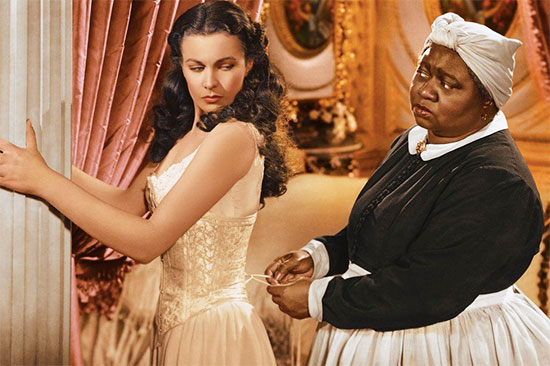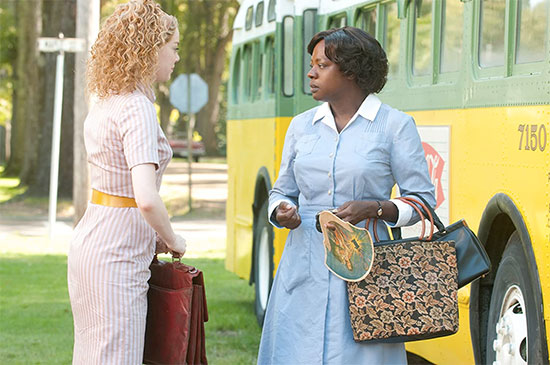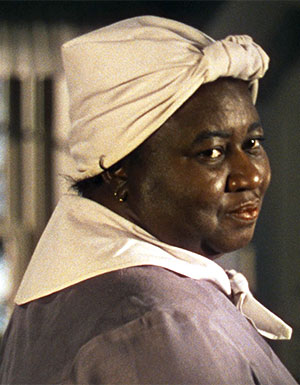Though it feels like a lifetime, it was only a few months ago that the world was thrust into a pandemic of Victorian proportions, and no amount of “Downton Abbey” seems to abate the rising anxiety. And recent events have spotlighted another illness we are all processing: systemic racism.
As historical drama lovers, we embrace stories of the past with loving arms because they are a balm in times of turmoil. But how do our beloved films distort fact and perpetuate problematic tropes that live on screen and in life?

To help keep this site running: Willow and Thatch may receive a commission when you click on any of the links on our site and make a purchase after doing so.
Seemingly innocuous historical dramas harbor harmful depictions of Black history. At the forefront of many dramas is a leading white character that is largely credited with improving the lives of his or her Black counterparts. In an article for The Atlantic, Nigerian-American writer, Teju Cole, contextualizes what is called the White Savior Industrial Complex: “[it] is not about justice. It is about having a big emotional experience that validates privilege.”
In many historical dramas, the white savior’s good deeds occupy most of the plot so that the Black narrative is lost and inevitably devalued. The white character often feels like their favors to Black people exempt them from complicity in the wider oppressive system. The White-Savior Industrial Complex is a dangerous mode-of-thought that has spilled into popular culture.
Historical drama doesn’t need another white savior. In light of that, this article delves into two primary examples of critically acclaimed dramas — “Gone with the Wind” and “The Help,” that exemplify the White Savior trope, and how the use of this trope ultimately robs historical drama lovers of genuine stories. We also share some period dramas from Black creators, and other resources.
Gone with the Wind (1939)

The Hollywood classic Civil War drama Gone with the Wind has long been criticized for its glorification of the American south. The film follows the pettish Scarlett O’Hara (Vivien Leigh) as she navigates a love triangle with Ashley Wilkes (Leslie Howard) and Rhett Butler (Clark Gable) at the outset of the Civil War. The Confederacy’s eventual loss undermines Scarlett’s southern heritage and ultimately challenges her position of privilege.
“Gone with the Wind” frames Scarlett and her family as decent human beings, though the fact that they own slaves is a contradictory point. In a widely-read op-ed for the Los Angeles Times, “12 Years a Slave” (2013) director John Ridley writes: “It is a film that, when it is not ignoring the horrors of slavery, pauses only to perpetuate some of the most painful stereotypes of people of color.” Indeed, the creation of Hattie McDaniel’s Mammy, Scarlett’s loyal and maternal house servant, trivializes a violent racist past by distilling it into a caricature.
The National Museum of African American History and Culture Museum defines the “mammy” archetype, “the trope painted a picture of a domestic worker who had undying loyalty to their slaveholders, as caregivers and counsel. This image ultimately sought to legitimize the institution of slavery.”
Mammy’s relationship with the white and privileged Scarlett is not equal no matter how much affection they may show each other. The film’s narrative is framed in a way that admonishes the O’Hara family and presents them as Mammy’s allies because they speak to her as if she’s a friend. In fact, they operate Tara, their Georgia plantation, by demanding Mammy’s thankless servitude and they exercise their privilege at her expense.
They may be fictional characters, but modern viewers should view the dynamic as an imbalance of power, not a familial bond between a young southern belle and a woman at the top of the slave hierarchy. Harking back to Ridley’s commentary, “Gone with the Wind” embraces the harmful stereotypes that have kept white people distant from the Black community’s expansive suffering.
If adapted today, a progressive audience would hope to see more time invested in Mammy’s narrative, written and performed by Black creators, and a realistic depiction of power dynamics on southern plantations during and following the American Civil War.
The Help (2011)

Upon its release, Tate Taylor’s film The Help was heralded as an emotionally poignant depiction of Black women who served affluent white families in Jackson, Mississippi during the 1960s. However, the mid-century drama reveals a problematic erasure of Black voices. Despite the title’s suggestion, the film does not focus on the voices of “the help,” rather their experiences are stepping stones in a white character’s overarching narrative.
The film is based on Kathryn Stockett’s 2009 novel and is told through the perspective of Eugenia “Skeeter” Phelan, an Ole’ Miss graduate and aspiring author. She finally finds her muse in the Black maids that work in Jackson, and so begins to interview them. The audience sees Aibileen Clark (Viola Davis) and Minny Jackson (Octavia Spencer) experience abhorrent racism from their employers as Skeeter vigorously takes notes in the comfort of her family’s cotton plantation, Longleaf.
Ideally, Skeeter’s journalistic endeavor would shine a light on the racial divide in domestic labor. This isn’t the case, however, since Aibileen’s and Minny’s experiences are footnotes in Skeeter’s larger story of becoming a published author.
She embodies the White Savior trope as she concocts a noble plan to expose the horrid daily lives of Black women in domestic service. She has a naive belief that her writing might change the views of her racist community and it is doubly problematic that she publishes her completed research anonymously. With enough gumption and the power of the pen, Skeeter thinks she will be the one to fix the world for her Black neighbors.
In an interview with Vanity Fair, Viola Davis expresses her regret in taking the role:
“I just felt that at the end of the day that it wasn’t the voices of the maids that were heard. I know Aibileen. I know Minny [played by Octavia Spencer, who won a best-supporting-actress Oscar]. They’re my grandma. They’re my mom. And I know that if you do a movie where the whole premise is, I want to know what it feels like to work for white people and to bring up children in 1963, I want to hear how you really feel about it. I never heard that in the course of the movie.”
Indeed, “The Help” lacks the voice that is most valuable in a story about racism. And to define the film as a heartwarming drama undermines the true gravity of Black women’s stories. The Economist records that 60% of Black women were employed as maids by the year 1940, and that number had increased by 1963 when the period drama takes place. Their voices should be heard, even in works of historical fiction.
Some Resources
Historical dramas are improved when they are rooted in honesty, and it’s important for viewers to know that stories are distorted for the sake of white comfort. Educating oneself is a lifelong endeavor that is enriched by the art in which we choose to indulge.
There is no shame in having loved a film that proves problematic. As historical drama lovers, we must reflect on why, learn from our observations, and seek the art that teaches as well as entertains. While period drama is a lovely form of escapism, we can’t escape the ever present inequity that exists, still, in the 21st century.
As part of learning how to center Black narratives, here is a list of suggested films and online series:
Historical Dramas by Black Creators
If Beale Street Could Talk (2018)
Selma (2014)
Malcolm X (1992)
Historical Documentaries
Freedom Riders (PBS American Experience)
I am Not Your Negro (PBS Independent Lens)
The Loving Story (2011)
Free Angela and All Political Prisoners (2012)
Miscellaneous History-Based Media by Black Creators
Black Girl in a Big Dress YouTube Series
NotYourMommasHistory YouTube Series
Bonnets at Dawn podcast
The Nod podcast
Kailey Rhone makes use of her English degree working as a production editor in the world of academic publishing. She can be found rewatching “Downton Abbey” and sipping on another cup of Earl Grey when she’s not writing about the intersection of feminism and Jane Austen’s novels. Her work can be found in Persuasions.
If you enjoyed this post, wander over to The Period Films List. Also see Period Dramas for Black History Month.



Sheila Moon
July 15, 2020 at 10:26 pm (5 years ago)My God! Give it a break with the systemic racism BS. It is people who think like you who are actually driving a wedge between races. You are REALLY OVERTHINKING the whole thing. This is a classic case of reverse racism. Please unsubscribe me!
Kailey
July 15, 2020 at 10:51 pm (5 years ago)Choosing not to discuss race keeps us in a standstill. Acknowledging identity and the ways in which people are treated differently based on skin color is just the first step in correcting a society built upon prejudice. If you think discussing systemic racism is an insult to you personally, then I think you’re capable of empathizing with feelings of discrimination and inequity. Which is a great starting point in dismantling systemic racism, a problem that persists whether or not we choose to recognize its existence.
GJW
July 15, 2020 at 7:48 pm (5 years ago)I do not wish to “learn how to CENTER(?) black narratives” I also do not regard HISTORY as “problematic”
I do escape the crass 21st century via THE PERIOD dramas hence why I subscribe to this site.
Kailey
July 15, 2020 at 10:56 pm (5 years ago)It’s a great loss choosing to not learn more about other perspectives. I’m afraid escaping the crassness of the 21st century will prove difficult, as even historical dramas reflect the darker aspects of history that form the basis of the society we live in today. History, rife with slave-trading, genocides, and global war, is problematic, indeed.
Thea
July 12, 2020 at 9:43 pm (5 years ago)I appreciate the writer’s reasoning. Honestly, I never liked The Help because I thought it was contrived and spot on in terms of the whole white savior trope. Gone with the Wind I feel slightly different about in that Hattie Daniel’s character ruled the downstairs roost and exerted a lot of Wrath based power over Scarlett, who was a naughty trickster grown into a calculating woman with many pluses and flaws. And Big Joe has to save her bacon out the Decatur Road that lead to the family into danger. I think Twelve Years a Slave should be required watching. An amazing, horrific and, I suspect, quite realistic depiction of that time and place. The show I really can’t stand though it is a pretty interesting story is Beecham House (a masterpiece pbs show) depicting English privilege in colonial era India. I despise attitude of the pillaging English towards Indians and worse, Indian servants. The handsome white savior hero can’t save that story for me.
Willow and Thatch
July 12, 2020 at 9:55 pm (5 years ago)Hi Thea, regarding Beecham House, you may be interested to read the words of series co-creator, writer and director Gurinder Chadha. https://www.willowandthatch.com/beecham-house-director-gurinder-chadha-interview/
cynthia collins
July 12, 2020 at 1:28 pm (5 years ago)I am insulted that anyone believes ,I watch period movies or shows , and take them as history. I am well aware that “Hattie” is a slave in Gone with the wind, no matter what the character does, or says she’s a slave. I am not alarmed at how black characters ,or lack of black characters are represented in period programs, because I am smart enough to know what reality was at that time.
I am afraid that newly made period entertainment will simply cast blacks as an accessory in stories just so they will not be called racist.(which is more racist than no story lines for blacks) l watch period dramas and stories for entertainment, I want to get away from real life, entertain me ,do not try to teach me.
Kailey
July 12, 2020 at 9:57 pm (5 years ago)I have to repeat that to enjoy a movie even if it’s problematic isn’t an offense in any way, so you are free to get away from real life for two-hour periods of time. In the most concise way as possible, I’m trying to express my own opinion that offering different perspectives in historical drama–and in this case a Black perspective–only makes the viewing experience deeper. I can only teach as much as you want to listen, so you are free to be entertained, though I personally enjoy the learning experience as well when I watch movies.
Bb
July 11, 2020 at 4:00 am (5 years ago)Funny how someone can see two films and understand exactly the opposite of what they are really saying. Scarlett, a good person? Lol.
Kailey
July 12, 2020 at 9:59 pm (5 years ago)What’s your perspective on these movies? It’s likely different than my own because we all understand and parse out different elements of the art we consume.